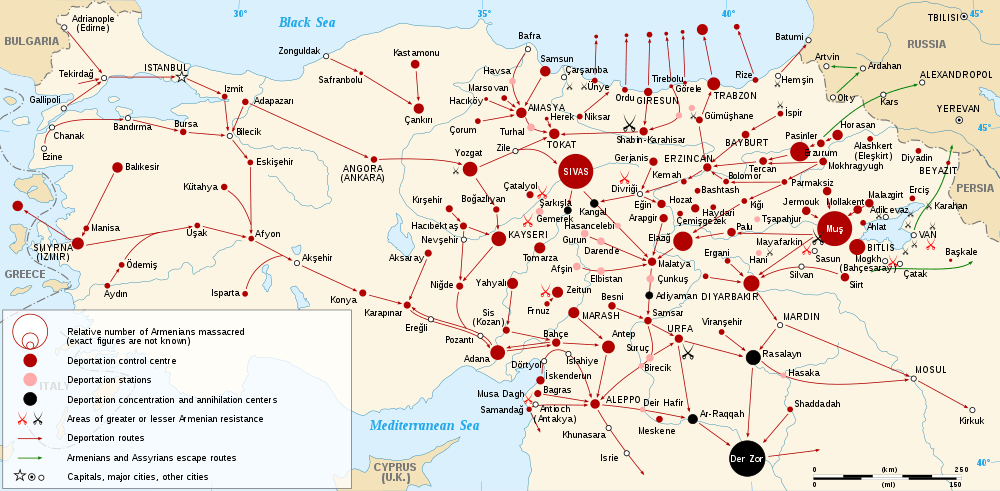Armenia without Armenians
Armenia without Armenians is a phrase with different meanings.
Armenian Genocide

Some Armenian and non-Armenian scholars use the phrase in reference to the aftermath of the Armenian Genocide of 1915, which left the Turkish-controlled parts of the Armenian homeland without significant Armenian population.[1][2][3]
Russian Empire
In the late 19th and early 20th centuries, several Imperial Russian officials proposed the policy of "Armenia without Armenians",[4] most notably Aleksey Lobanov-Rostovsky, foreign minister in 1895–96.[5][6][7]
During World War I, the Russian army occupied Turkish Armenia with the help of the Armenian volunteer units. In 1916, the Russian government disbanded the Armenian volunteer units. General Nikolai Yudenich, who led the Russian army into the Armenian-populated areas of the Ottoman Empire during the Caucasian Campaign of World War I, proposed a plan of deporting the remaining Armenians from their ancestral homes.[8] The Russian government seriously considered the possibility of repopulating the Armenian lands by Russian peasants and Cossacks.[5][9]
Emigration from Armenia
In the early 21st century, the phrase is often used to refer to emigration from Armenia. In 2009 the Russian government began migration program, called "Compatriots", which encourages Armenians to settle in Russia.[10] Sociologist Ruben Yeganyan,[11] and Nagorno-Karabakh War veteran Sargis Hatspanyan,[12] and political analyst Ruben Mehrabyan[13] stated that the program leaves Armenia without Armenians. In 2013 Hatspanyan linked what he saw as Russia's policy of an "Armenia without Armenians" to the Armenian government's decision to join the Eurasian Union and the possibility of a mass emigration to Russia.[14]
See also
References
- Derogy, Jacques. Resistance and Revenge: The Armenian Assassination of the Turkish Leaders Responsible for the 1915 Massacres and Deportations. 1990: Transaction Publishers. pp. 24–25. ISBN 9781412833165.
Massacres and deportations had answered the prayers of those who dreamed of an Armenian without Armenians. The act was given a name after the Jewish martyrdom during World War II. It was called 'genocide.' The horror of the genocide of 1915-1916 cannot be measured by the number of victims.
CS1 maint: location (link) - Gasparyan, Seda. "The word yeghern and the semantic field of its equivalence in English" (PDF). Armenological Researches Institute of Yerevan State University. p. 3. Archived from the original (PDF) on November 16, 2014.
As it happened, the Turkish beneficiaries of an “Armenia without Armenians” and, despite worldwide pledges and promises to punish the perpetrators, escaped any responsibility for the crime.
- Barseghov, Yuri (1987). "Геноцид армян—преступление против человечества (О правомерности термина и юридической квалификации) [Armenian genocide—a crime against humanity (on rightfulness of the termin and juridical qualification)]". Lraber Hasarakakan Gitutyunneri (in Russian) (4): 25. ISSN 0320-8117.
Скрыть от мира физическое уничтожение одного из древнейших народов мира, внесшего крупный вклад в развитие человеческой цивилизации,—задача, конечно, 'непосильная. Армения без армян—сама по себе представляет неопровержимое доказательство геноцида.
- Azadian, Edmond Y. (25 June 2013). "Friend or Foe?". Armenian Mirror-Spectator.
The rulers of Christian Russia were relatively more tolerant than, let’s say, their Ottoman counterparts. But the word “relative” needs to be understood in its full implication here, as Armenians subsequently heard warnings by Russian officials that Russia needs Armenia without Armenians. Just one example of Russian tyranny was that Armenian church property was confiscated by a decree of the czar.
- Suny, Ronald Grigor (1994). The Making of the Georgian Nation (2nd ed.). Bloomington: Indiana Univ. Press. p. 180. ISBN 9780253209153.
- Weiss, Martha (1920). Zwemer, Samuel Marinus (ed.). "The Armenian Question". The Moslem World. New York: Missionary Review Publishing. 10: 343.
- Somakian, Manoug (1995). Empires in Conflict: Armenia and the Great Powers, 1912-1920. I. B. Tauris. p. 23. ISBN 9781850439127.
- Veenhoven, Willem Adriaan (1975). Case Studies on Human Rights and Fundamental Freedoms Volume Two: A World Survey. The Hague: Martinus Nijhoff Publishers. p. 499. ISBN 9789024717811.
- Hovannisian, Richard (1971). The Republic of Armenia: Volume 1, The First Years, 1918–1919. Los Angeles: University of California Press. pp. 14–15. ISBN 0-520-01805-2.
- Grigoryan, Marianna (25 March 2011). "Armenia: Russian Guest Worker Program Highlights Population Drain". EurasiaNet. Open Society Foundations.
- Abrahamyan, Gayane (2 March 2011). "Dangerous Decline: Demographers raise alarm over exodus from Armenia". ArmeniaNow.
“What does ‘it worries’ mean, if they [the government] cannot even prevent the program which leaves Armenia without Armenians, initiated by their strategic partner?” says sociologist, expert, Ruben Yeganyan (who has worked with UN and other international institutions on the issue).
- "Armenia without Armenians is what Russia wishes, says expert". Tert.am. 24 May 2013.
“Russia implements the ‘Armenia without Armenians’ program. Migration in my country has reached such a level that one doesn’t have to even offer a weapon. There has to be someone to use it,” he noted.
- "Political expert: Russia wants to fill its demographic hole with migrants from Armenia". A1plus. 10 July 2014. Archived from the original on 16 November 2014.
- Martirosyan, Armine (18 September 2013). "Вступление Армении в Таможенный союз приведет к утрате суверенитета, заявили бывшие политзаключенные" (in Russian). Caucasian Knot.
Таможенный союз приведет к массовой миграции, считает бывший политзаключенный. "Россия уже давно ведет политику "Армения без армян". Тому доказательство российская программа "Переселение соотечественников", которая способствовала большой миграции из Армении в Россию целыми семьями", - отметил в своем выступлении Ацпанян.